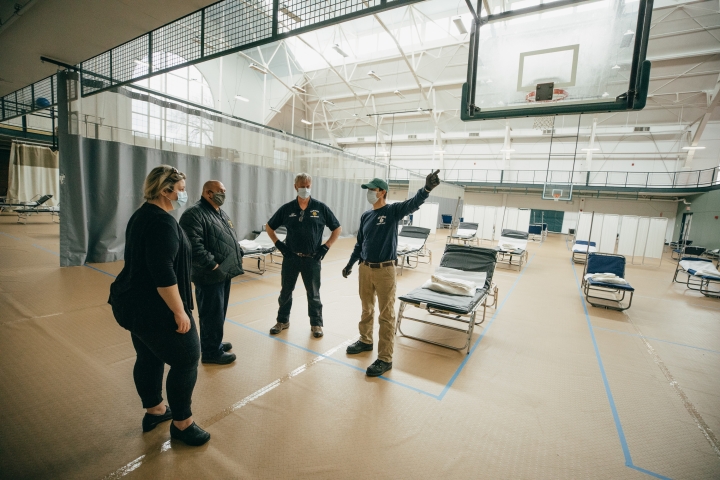Like every institution of higher learning in the land, Dartmouth has been focused on the challenges of keeping the institution’s operations running during the pandemic and safeguarding the community of faculty, students, and staff. At the same time, Dartmouth has been mindful of the greater community, and has been working to help out in a number of ways. In recent months, something that has taken on an even greater clarity is the need for neighbors to help neighbors, and Dartmouth’s relationship with its Upper Valley neighbors goes back a long, long way.
In support of the Upper Valley community during the COVID-19 pandemic, Dartmouth has forgiven rent payments; made space available to house first responders and patients from Dartmouth-Hitchcock Medical Center; provided storage space for critical medical supplies and other items; and donated personal protection equipment.
In the town of Hanover, base rent payments from small retailers who are tenants in Dartmouth-owned commercial properties have been forgiven for April and May to help the companies focus on maintaining their businesses, says Executive Vice President Rick Mills. That amounts to about $200,000, and Dartmouth will consider future abatement if circumstances require it, he added.
“We are committed to supporting our tenants through these challenging times and helping to maintain the viability of downtown Hanover,” says Mills.
Hanover Town Manager Julia Griffin says the town is grateful to have Dartmouth as a key partner in the community’s COVID-19 response.
“We have been better able to care for our community with the College by our side,” she says. “Their willingness to make College space available for implementation of an alternate care site for DHMC and for an accompanying command post; their willingness to ready a dormitory for housing critical first responders; and their decision to waive rent for their downtown commercial tenants for April and May are just a few examples of their assistance to the community and to the region.”
The campus has been mostly closed since mid-March, when students were told not to return from spring break and employees who could perform their jobs remotely began working from home. Classes have been held online through spring term and will continue to be conducted remotely through the summer term.
With space available on campus, Dartmouth worked with members of the New Hampshire Army National Guard to set up West Gym to be used by DHMC if the medical center experiences a surge in COVID-19 patients and needs to house patients requiring lower levels of care. To date, the space hasn’t been needed.
Dartmouth has also made available housing space in a College-owned residence hall on Webster Avenue for 25 first responders and health care professionals who might need alternative housing during the pandemic. That space has not yet been needed.
“While we wish our students, faculty, and staff could be on campus, we are glad to be able to offer the use of empty space during this health care crisis,” says Mills.
Space was also made available to DHMC in the Hillcrest building, on Route 120 near Centerra Park, earlier in the pandemic for storage of personal protective equipment. In addition, several Dartmouth laboratories have donated protective equipment to DHMC. And alumni in various locations have been involved in helping the medical center receive shipments of protective gear.
In addition food storage space has been made available by Dartmouth Dining Services for use by Meals on Wheels programs to store frozen food, bulk ingredients, and beverages. The meals programs serve older adults in a number of Upper Valley communities and are run by social service agencies in the region.
“We are eager to help our neighbors in need as we work with our community partners at this difficult time,” Mills says.
For the latest information on Dartmouth’s response to the pandemic visit the COVID-19 website.
Susan Boutwell can be reached at susan.j.boutwell@dartmouth.edu.
